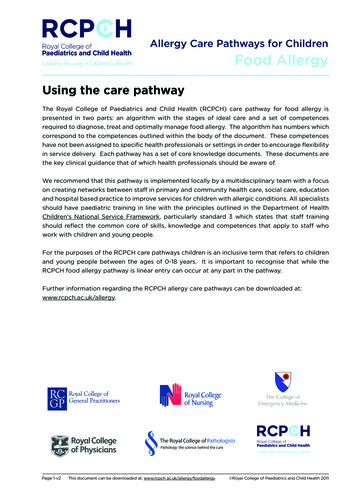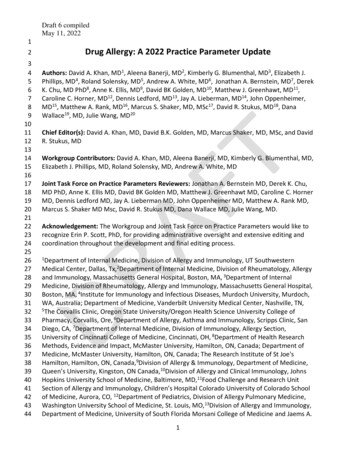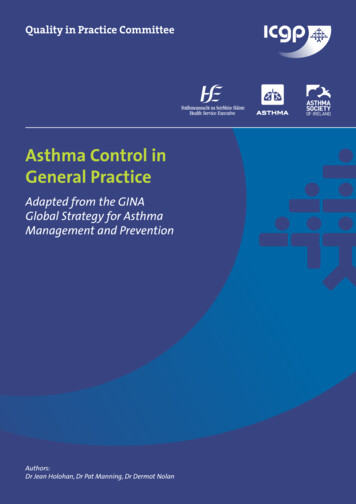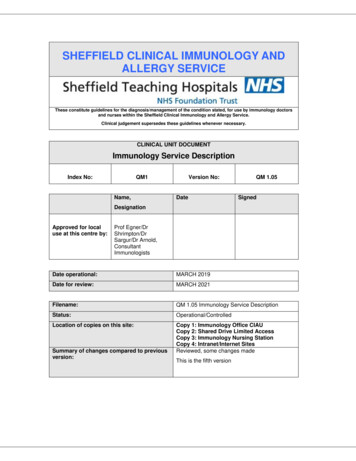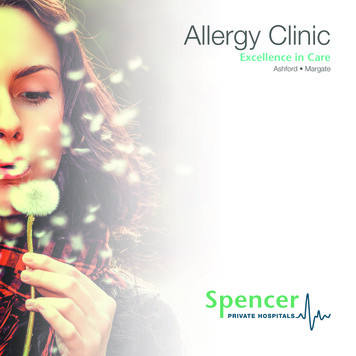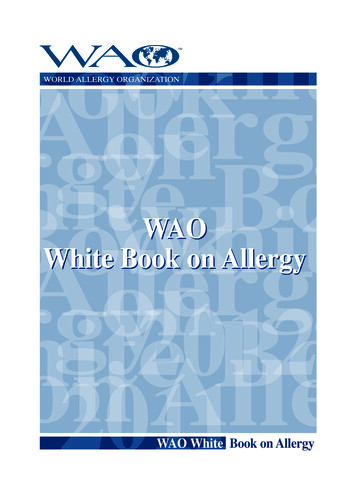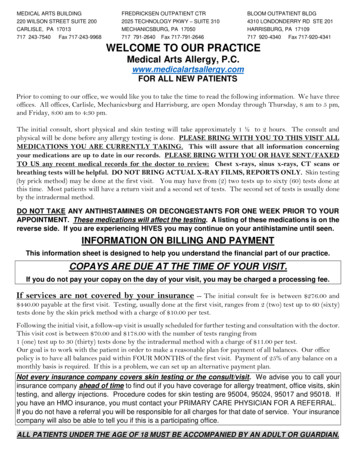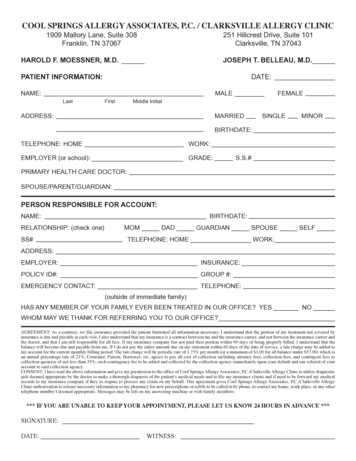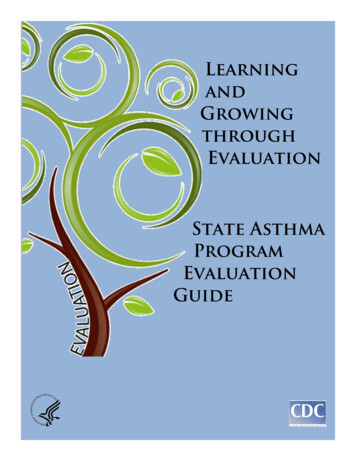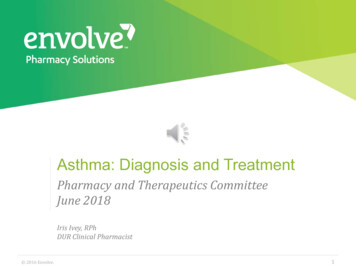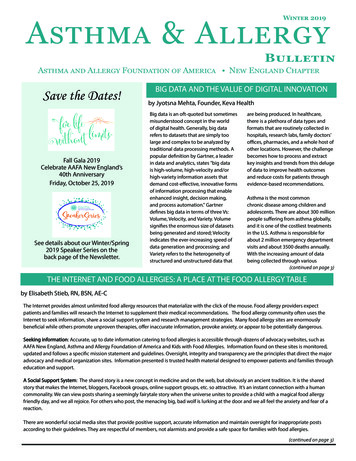
Transcription
Asthma & AllergyWinter 2019BulletinAsthma and Allergy Foundation of America New England ChapterSave the Dates!Fall Gala 2019Celebrate AAFA New England’s40th AnniversaryFriday, October 25, 2019See details about our Winter/Spring2019 Speaker Series on theback page of the Newsletter.BIG DATA AND THE VALUE OF DIGITAL INNOVATIONby Jyotsna Mehta, Founder, Keva HealthBig data is an oft-quoted but sometimesmisunderstood concept in the worldof digital health. Generally, big datarefers to datasets that are simply toolarge and complex to be analyzed bytraditional data processing methods. Apopular definition by Gartner, a leaderin data and analytics, states "big datais high-volume, high-velocity and/orhigh-variety information assets thatdemand cost-effective, innovative formsof information processing that enableenhanced insight, decision making,and process automation." Gartnerdefines big data in terms of three Vs:Volume, Velocity, and Variety. Volumesignifies the enormous size of datasetsbeing generated and stored; Velocityindicates the ever-increasing speed ofdata generation and processing; andVariety refers to the heterogeneity ofstructured and unstructured data thatare being produced. In healthcare,there is a plethora of data types andformats that are routinely collected inhospitals, research labs, family doctors'offices, pharmacies, and a whole host ofother locations. However, the challengebecomes how to process and extractkey insights and trends from this delugeof data to improve health outcomesand reduce costs for patients throughevidence-based recommendations.Asthma is the most commonchronic disease among children andadolescents. There are about 300 millionpeople suffering from asthma globally,and it is one of the costliest treatmentsin the U.S. Asthma is responsible forabout 2 million emergency departmentvisits and about 3500 deaths annually.With the increasing amount of databeing collected through various(continued on page 3)THE INTERNET AND FOOD ALLERGIES: A PLACE AT THE FOOD ALLERGY TABLEby Elisabeth Stieb, RN, BSN, AE-CThe Internet provides almost unlimited food allergy resources that materialize with the click of the mouse. Food allergy providers expectpatients and families will research the Internet to supplement their medical recommendations. The food allergy community often uses theInternet to seek information, share a social support system and research management strategies. Many food allergy sites are enormouslybeneficial while others promote unproven therapies, offer inaccurate information, provoke anxiety, or appear to be potentially dangerous.Seeking information: Accurate, up to date information catering to food allergies is accessible through dozens of advocacy websites, such asAAFA New England, Asthma and Allergy Foundation of America and Kids with Food Allergies. Information found on these sites is monitored,updated and follows a specific mission statement and guidelines. Oversight, integrity and transparency are the principles that direct the majoradvocacy and medical organization sites. Information presented is trusted health material designed to empower patients and families througheducation and support.A Social Support System: The shared story is a new concept in medicine and on the web, but obviously an ancient tradition. It is the sharedstory that makes the Internet, bloggers, Facebook groups, online support groups, etc. so attractive. It’s an instant connection with a humancommonality. We can view posts sharing a seemingly fairytale story when the universe unites to provide a child with a magical food allergyfriendly day, and we all rejoice. For others who post, the menacing big, bad wolf is lurking at the door and we all feel the anxiety and fear of areaction.There are wonderful social media sites that provide positive support, accurate information and maintain oversight for inappropriate postsaccording to their guidelines. They are respectful of members, not alarmists and provide a safe space for families with food allergies.(continued on page 3)
FROM THE EXECUTIVE DIRECTORDear Readers,2019 AAFA New EnglandBOARD OF DIRECTORSJan Hanson, MA, PresidentSuzanne Ginouves, Vice PresidentTara McCarthy, RD, ClerkLyndsay King, CPA, TreasurerLisa Bartnikas, MDJennifer LeBovidge, PhDJudi McAuliffe, RNGiuliana PeguriRobert StokerElizabeth TePas, MDMark UzzellMEDICAL ADVISORY COMMITTEEJennifer LeBovidge, PhD, ChairLisa Bartnikas, MDMichael Pistiner, MDSusan A. Rudders, MDHONORARY DIRECTORSIrving Bailit, MDBette BarbadoroGeorge BehrakisCynthia DaleyJoseph FerneyHon. Gordon Martin, Jr.Frank J. Twarog, MD PhDFOUNDING PRESIDENTAlbert L. Sheffer, MD(1929-2015)EXECUTIVE DIRECTORDavid GuydanOne part of my background during my for-profit years was in thefield of collecting, managing and distributing large databasesfor use by banks, brokers, money managers, investment banksand others. Over time, technology made these databasesavailable, not just to institutions, but to individuals as mainframecomputers gave way to micro computers and, now, personaldevices connected to the Internet and powered by apps thatsupport thousands of tasks.There are few areas of human endeavor today that are untouched by technology whichis a theme of this edition. In her article, “The Internet and Food Allergies,” ElisabethStieb reminds us to be cautious about food allergy resources abundantly available incyberspace, while suggesting strategies for finding trustworthy information online. In“The Importance of Big Data and the Future of Digital Innovation,” Jyotsna Mehta explainsthe use of “big data” in healthcare, generally, and in asthma management, specifically.Please take note of Dr. Michael Pistiner’s “Food Allergy Management Boot Camp” forparents and caregivers of food allergies. Attend in person at Massachusetts GeneralHospital, join the interactive group sessions live-streamed, or view the recordings of eachBoot Camp on Facebook.Jan Hanson, AAFA New England Board President, summarizes the conclusions andrecommendations of our Sanofi Genzyme-sponsored “Be Smart and Breathe EasyProgram,” citing the many positive outcomes of the Program and holding out thepossibility of expanding such asthma education and asthma trigger remediation in ourchildren’s schools.Our Board of Directors and our membership are committed to advocacy initiativesso that we can impact policy or influence state legislatures on bills that affect ourcommunity. Board member Bob Stoker is pounding the pavement in New Hampshireand Massachusetts to find ways to lower prescription costs. One of our Honorees at theFall Gala 2018, Senator Cynthia Creem of Massachusetts, is a long-time proponent ofimproving food allergy policies through meaningful legislation. See two bills that sheintroduced in January which AAFA New England is supporting and learn how you, too,can make your voice heard.Check out our “Research Update” to learn about new research in the field of asthma andallergies and opportunities to help through involvement in clinical trials and live studies.We hope you enjoy reading and find useful our Asthma & Allergy Bulletin. We welcomeyour comments. Let me know what you think about our Newsletter, offer topics you’d liketo see in future editions, or suggest ways to improve it. Send me an email at:david@aafane.org.Warm regards,David GuydanExecutive Director2
BIG DATA AND THE VALUE OF DIGITAL INNOVATION (continued from page 1)sources, it is possible to analyze thedata and provide real time insights.Administrative healthcare claims andelectronic health record data can beused to identify those patients withhigher risk and to study treatmentpatterns among specific sub-groups.These types of information wouldallow healthcare providers to deliverbetter quality care and for patients toprevent the incidence of emergencyroom events. Using blood andsputum samples collected from alarge number of patients, researchersare able to identify different subtypes of asthma and facilitate theresearch and development of newtreatments.Patient experience with medicaltreatments recorded in electronichealth records, insurance claims,patient registries, and newer mobiletechnologies can help shape thedesign of clinical research, expandproduct use, and assess the efficaciesof new therapies in the real world.Big data also helps in asthmamanagement. The developmentof smartphones and smart devicesmakes it possible for collecting datasecurely at any time and providingreal-time feedback. Applications oniOS or Android devices can help tomanage disease interactively, helppatients to implement individualaction plans, provide personalizedreminders, and send alerts based ontheir individual risk profiles.Hence, big data and digital toolsfocused on the detection, prevention,and management of specific chronicdiseases (including asthma andallergies) will generate a growingbody of evidence that demonstratestheir impact on human health andthat will help extrapolate potentialcost savings in our healthcare system.Its adoption requires patients,physicians and payers to embrace theavailable technologies and engageto improve patient outcomes andreduce costs.Jyotsna Mehta,Founder, KevaHealth, is anentrepreneur indigital health andanalytics bringingover 18 yearsof experiencein academia, regulatory affairs, and thepharmaceutical industry. The parent of a childwith asthma, Jyotsna founded and developedKeva Health Advisor, a digital platform thatuses artificial intelligence to help asthmapatients manage, track, alert and recommendtreatment options. www.kevahealth.comLEGISLATIVE ADVOCACYIn Massachusetts, State Senator Cynthia Stone Creem(D-Newton) is a long-time proponent of improving foodallergy policies. In January, Senator Creem filed two billsof consequence: SD618, will require schools to have Food Allergy andPrevention Plans, and require training for schoolpersonnel on how to prevent allergic reactions, andprocedures to follow if an allergic incident occurs.SD680, an act to improve food allergy awareness,builds on existing law, by requiring restaurants todesignate an individual with knowledge aboutfood allergy issues to coordinate food service forcustomers who identify themselves as having foodallergies.Editor's note: one of our constituents, Nicole Arpiarian,the mother of a child who had a life-threatening allergicreaction, has for the last year dedicated herself to fightfor positive actions that will make restaurants safer forthose with food allergies.In New Hampshire, Robert Stoker, AAFA New EnglandBoard Member, has been advocating that, if anything,copay cards reduce the costs of pharmaceuticals toboth insurance companies and patients. While theinsurance industry testified otherwise at hearings on thematter, the legislative committee hearing the testimonyrecommended that copay cards/coupons shouldcontinue to be allowed. Clearly a win for AAFA NewEngland’s constituencies.In Massachusetts, a bill to outlaw the use of copaycards is now being considered. In addition to AAFANew England’s plan to contact legislators and testifybefore committees, individuals should contact theirown state representatives, voicing strong support forcontinuing the use of copay cards to keep lower the costof prescriptions. It is with your help that we can havepositive impacts on the policies that affect us all!THE INTERNET AND FOOD ALLERGIES (continued from page 1)Many Facebook groups, however, do not have any administrative oversight. Memberspost inaccurate, discrepant information. Repeatedly, they post videos or photosseeking medical advice, which is then provided in multiple conflicting responses. Somepost videos of their child experiencing a systemic reaction rather than following theirfood allergy action plan or seeking emergency care. It is a disturbing trend that goesunchecked with no recourse. Being inundated with frightening or negative social mediaaffects quality of life. Anxiety can spike and misinformation is reinforced.Elisabeth (Lisa) Stieb RN, BSN, AE-Cis a food allergy nurse and certifiedasthma educator at MassachusettsGeneral Hospital Food Allergy Centerfor 19 years. She is mother of twosons with food allergies and has beeninvolved with food allergies for 28years.Management Strategies: An abundance of helpful information exists on the web. Food allergen avoidance, label reading strategies,manufacturer recalls, research and innovation, how to manage food allergies in schools and childcare, dining out with food allergies, recipesand substitutions are some of the myriad management strategy offerings.Finding a balance of food allergy information online is critical to health and emotional wellbeing for caregivers and children. Find your sweetspot by knowing where the best information for your family is posted. There is a place for everyone at the food allergy table as we all share inthe bounty of information accessible, but be careful not to overindulge on the unhealthy offerings.3
AAFA New England: NEWS AND NOTESAAFA New England GalaOctober 18, 2018Boston College ClubOur first Fall Gala wasa huge success and amemorable evening!More than 120 guestswere greeted by theBoston skyline, aglowing sunset, and the rich sounds of a jazztrio.Our Honorees (picturedabove, Senator CynthiaStone Creem - center- with AAFA NE boardchair, Jan Hanson andAAFA NE executivedirector, David Guydan,and right, Dr. WayneShreffler and Dr. WandaPhipatanakul) were recognized for theiroutstanding work in helping people withasthma and allergies.Thanks to thegenerosity ofour sponsors,attendeesand others,we exceededour fundingexpectationsand garneredthe support we need to continue ourimportant educational programming,support services, Speaker Series, andadvocacy on behalf of our valued asthmaand allergy community (AAFA New Englandboard members pictured above).Massachusetts Health Council Award’s GalaDecember 8, 2018, Seaport HotelBoston Red Sox Peanut Allergy-FriendlyProgram at Fenway ParkAs the largest andoldest health councilin the U.S., the MassHealth Councilpromotes policies andprograms that enablehealthier lifestyles,David Guydan and wellness and preventativeDavid Martin, Mass care. Asthma is citedHealth Councilamong the preventableExecutive Directorhealth conditions in itsannual report on the “Common Healthfor the Commonwealth.” The Mass HealthCouncil supports the goals of research andchanges to policy and practice aimed atreducing risk factors for the complex chronicdisease, asthma.In November, a group (seephoto) representing AAFANew England met withFenway Park officialsregarding their PeanutAllergy-Friendly Program.During the 2019 baseballseason, the Red Sox will setaside the “right field terrace” with properpreparations and care to create anenvironment at these games safe for fanswho are allergic to peanuts. The sectionaccommodates up to 160 fans, hascontrolled access, and is close to concessionstands that for these games are PeanutAllergy-Friendly. Our team made a numberof recommendations including care inwashing down the section designated priorto game time, training of food servicemanagers andservers,communicationof protocolsamong staff, andoffering wipes iffamilies elect towipe down theirown space.New England Society of Allergy (NESA)Fall MeetingOn October 20, 2018, Board Member BobStoker and David Guydan, attended asexhibitors at the NESA Fall Meeting inPlymouth, MA. Moderated by Lisa Bartnikis,MD, (pictured right) AAFA New EnglandBoard Member andMember of our MedicalAdvisory Committee,the agenda providedCME and CEU accreditedpresentations for NESAmembers and theirnursing and support staff. Our presenceafforded us visibility with an importantconstituency that is highly supportive of ourprograms.Want to a take your family to a ball game?Peanut Allergy-Friendly games will be heldon April 28, May 12, June 9, June 23, August11 and 18. A mid-July date is also planned.To get on the Red Sox Peanut-Free mailinglist, send an email to: PeanutAllergy@redsox.com.SUMMER CAMP: SAFETY AND SUCCESSby Sue LeinClass trips,sleepovers andparties make youvery nervous,right? Andsummer camp,well, that wouldnever be possible. But what if it were?! Yourchild with food allergies or celiac disease cango to camp. Asking questions and preparing safety and success. By using the samevigilance you approach making dinner,your child can have a safe and joyful campexperience.First, make a list of your requirements – day/overnight, specialized or general, singlesex, coed, etc. Then, prepare your list ofquestions. Here are my top 10 to ask:1. Have they supported other food allergyand celiac children? Get references.2. Who prepares the food? What is theirtraining?10. Describe the staff training andepinephrine procedures.3. How do they prevent crosscontamination?You will be able to tell the camp’s knowledgeand commitment to support children withfood allergies and celiac disease from theanswers to these questions. A positiveexperience will prepare you and your childfor future independence.4. What is the camp’s policy about outsidefood and packages?5. How is food managed on trips?6. Review a copy of the menu with thekitchen staff. Get a list of all gluten freeand allergy safe products available.7. How will you have access to the campdirector, health staff and kitchen?8. Be sure your child can read any label theywant and ask questions about the food.9. Day camp – who supervises the youngchildren? What about transportation?4Sue Lein is the Owner &Camp Director of CampEmerson in Hinsdale,MA. Camp Emerson is aFood Allergy SpecialistCamp and has beenhelping children withfood allergies and celiacdisease for over 20 years. Contact Sue athello@campemerson.com, or call 800-7823395 and mention this article.
AAFA New England: PROGRAM UPDATESBe Smart and Breathe Easy Program Makes a Positive Impact on Three Boston Inner City Schoolsby Jan Hanson, MA, AAFA New England Board PresidentIn April 2018, Jackie Rodriguez-Louis, LeadConsultant, and her consulting partners,Lillyana Hebbert and Meenakshi VermaAgrawal, were contracted by AAFA NewEngland to create and implement the BeSmart and Breathe Easy Program asthmaprogram for Boston inner city schools. Twokey and unique features of this asthmaprogram, as compared with other schoolasthma intervention programs, are that itwas designed to work with both Bostonschool nurses and custodial staff, and ithighlighted the need for remediationConsultants: Meenakshi Agrawal, LillyanaHebbert, Jacqueline Rodrigues-Louisof mouse presence, which recent studyresults showed to be the most significantenvironmental asthma trigger at schools.The overarching goal of the program wasto improve outcomes for students withasthma in Boston Public Schools (BPS)by reducing asthma triggers, increasingunderstanding of disease managementand treatment, and ultimately reducingschool absenteeism due to asthma.An elementary school, middle school, andhigh school were selected for the programto ensure cross-sectional impact. Basedon comparatively high asthma rates andIntegrated Pest Management (IPM) Indexes(total average percent of clutter, sanitation,and sign of overall pest activity), thefollowing three schools were chosen forthis pilot program: Boston Teachers Union,Mission Hill School and Excel High School.The Consulting Team first researched andreviewed existing materials and otherasthma intervention models to determinebest practices in asthma managementpertinent for program development.The team identified and met withkey collaborators and stakeholders invarious fields of education, support, andadvocacy in the Boston area, includingrepresentatives from BPS, Boston Children’sHospital, the Boston Public HealthCommission, the Massachusetts Coalitionfor Occupational Health and Safety,Health Resource in Action, as well as otherschool administrators. As a result of thesemeetings, strong partnerships were formedand the methodology for the program wasdrafted.The Consulting Team began with a walkthrough at each of the three schools,generally conducted with the leadcustodian, in order to understand thebaseline data, which revealed visiblemildew, old carpeting, indoor air qualityissues, and food and trash outside of thecafeteria and on school grounds. Based onthe Team’s observations, original, writtenmaterials were produced, such as slidedecks, fact sheets, and environmentalchecklists, all of which were translatedinto Spanish. The program design andmaterials were tested via focus groups, andthen program components were revised,as needed.The Be Smart and Breathe Easy AsthmaProgram was implemented in the threeselected schools with the school nursesand custodial staff, beginning in Octoberand ending in December, 2018. Commonthemes that emerged in the processincluded: the need for accurate asthmarates in BPS; more strategic Asthma ActionPlan implementation; improved classroomtracking of children with most asthmasymptoms in relation to environmentaltriggers present; remediation ofenvironmental triggers; and the need toevaluate the HVAC systems, many of whichare old.AAFA New England was pleased to donateeducational materials, nebulizers andtubing, spacers, EpiPen cases, and foodallergy wristbands.5Conclusions and Recommendations:The Consulting Team found that AAFANew England’s Be Smart and Breathe EasyAsthma Program resulted in many positiveoutcomes in the schools, including: An increased knowledge aboutasthma and the environment amongthe nurses, nurse interns, custodians,and school leadership. Custodiansand school nurses indicated that theasthma slide presentation was veryuseful, and suggested it would bea good refresher to present at theiryearly professional developmentworkshop. The school nurses’ recommendationthat it would be beneficial for AAFANew England to provide asthmaeducation for the students’ parents. Small environmental changes madeby the custodial staff that were in theircontrol, that will positively impactasthma outcomes, such as an uptakein the use of spray bottles with greencleaners and walk off mats. The recognition of the importanceof consistent, ongoing feedback andeducation for school staff and faculty.AAFA New England thanks Sanofi Genzymefor their generous grant to fund our BeSmart and Breathe Easy Asthma Program.Copies of the Be Smart and Breathe EasyAsthma Program Final Report are availablefrom AAFA New England upon request.Jan Hanson, MA, is Board President of AAFANew England, and founded EducatingFor Food Allergies, LLC in 2001 whereshe specializes in school food allergymanagement. Jan is nationally recognizedas a food allergy educator, author, speaker,and advocate.
RESEARCH UPDATE: OPPORTUNITIES TO HELPASTHMA PREVENTION STUDIES ATBOSTON CHILDREN’S HOSPITALThe Asthma/Allergy ClinicalResearch Centeris an NIH fundedCenter currently recruiting for a numberof studies for patients with asthma and/or allergies! All visits are compensatedand all travel to and from the hospitalis covered by the research group. Thestudies also provide free medications. PARK (Preventing Asthma in HighRisk Kids): Park is a prevention studyaimed at identifying whether 2 yearsof treatment with Xolair (AntiIgE) injections can prevent lastingasthma or reduce asthma severity inchildren ages 2-4 years with a historyof wheezing, allergies, and familyhistory. Xolair (or Anti-IgE) has beensafely established for decades totreat asthma in children and adults,but investigators want to study ifearly treatment could prevent ormodify the disease. These childrenare at very high risk of developinglasting asthma and other allergicconditions. This treatment blocks IgEwhich is important in allergies andhas been shown to provide antiviral benefits against the commoncold. We will also evaluate whetherthis treatment stops or modifiesthe allergic march, which includeseczema, food allergies and otherallergic conditions. ORBEX (ORal Bacterial Extract forthe prevention of wheezing lowerrespiratory tract illness): The goal ofORBEX is to find out if oral treatmentwith Broncho-Vaxom for 2 years canprevent lower respiratory wheezeor asthma like symptoms in childrenages 5-16 months who have eczema or who have a parent with asthma.The treatment is an oral treatmentmade of extracts of different kindsof bacteria responsible that hasbeen established in Europe to treatchildren for common respiratoryinfections.Vit-D Kids (Vitamin D to PreventSevere Asthma Exacerbations):The goal of the Vit-D Kids studyis to see if taking a large dailydose of Vitamin D for one yearcan reduce the number of severeasthma exacerbations experiencedby asthmatic children ages 6-17years old. All asthma controllermedication is provided to the familyduring the course of the study.The Asthma Clinical Research Centeralso has a number of observationalstudies, including EASY (EnvironmentalAssessment of Sleep in Youth) thatis assessing the environment andproviding home sleep monitoring, andevaluating the association betweenActivity Pediatric Outcomes in Childrenwith Chronic Conditions, using a Fitbit in school aged children. We arealso working on a variety of noveltherapeutics to treat bad asthma.For more information about any of theabove studies and/or for physicians torefer potential interested families, pleaseemail asthma@childrens.harvard.edu orcall 857-218-5336.Wanda Phipatanakul,MD, MS, is the Directorof the Asthma/AllergyClinical Research Center,Boston Children’sHospital, Professorof Pediatrics, HarvardMedical School6FOOD ALLERGY STUDIES AT MASSGENERAL HOSPITAL“Outcome of EarlyAllergen Introduction,”(abbreviation LEAP-IT)sponsored by the BroadInstitute. The primarygoal of the study is toevaluate the success of introducingfoods regarded as common allergens.The main eligibility criteria include: Agegreater than or equal to 4 months andless than 4 years old, and a referral by aMassachusetts General Hospital allergistfor food challenge as part of routineclinical care due to medical judgment ofincreased risk of allergy.Wayne Shreffler, MD,PhD, is division chiefof Pediatric Allergy& Immunology atMassGeneral Hospital(MGH) for Children anddirector of the FoodAllergy Center at MGH.RISING ASTHMA RATESAsthma rates in the United Stateshave been increasing over the last fewyears, and according to the Centers ForDisease Control, 1 in 13 people haveasthma. Boston, in fact, has one of thehighest asthma rates in the country.Asthma prevention is imperative, and isextremely cost-effective as comparedto the cost of acute medical treatmentin a hospital emergency department.Most importantly, asthma educationand asthma trigger remediation willserve to benefit the overall health andwell-being of all individuals with thischronic health condition.
THANK YOU TO OUR CORPORATE PARTNERSAAFA New England is grateful for theASTHMA & ALLERGY BULLETINsupport of our Corporate Partners in 2019.Published three times a year by theAsthma and Allergy Foundation of AmericaNew England Chapter781-444-7778Their generous support allows us to providevaluable resources to help our members livee-mail: aafane@aafane.orglife fully with asthma and allergies.Published with a grant fromThe Thoracic FoundationThe Asthma and Allergy Foundation of America,New England Chapter, is dedicated to helpingpeople with asthma and allergic diseases, andthose who care for them, through education,support for research and an array of services.Information contained in this newsletter should not beused as a substitute for responsible professional careto diagnose and treat specific symptoms and illness.Any reference to available products and proceduresshould not be construed as an endorsement. AAFANew England, including all parties to or associatedwith this newsletter, will not be held responsiblefor any action taken by readers as a result of thenewsletter. 2019. All rights reserved. Material maynot be reproduced without permission of the publisher.The Thoracic FoundationBECOME A MEMBER OR RENEW YOURMEMBERSHIP!MAKE A DONATION TO AAFA NEW ENGLANDDonations are gratefully accepted via checkmade payable to:AAFA New England or credit card on our websitewww.asthmaandallergies.orgMembership in AAFA New England helps you andothers with asthma and allergies to enjoy fullerlives.r Individual 35r Family (2 ) 50rrrrrrr Professional (MD & RN) 100r Practice Group 250MEMBERSHIP INCLUDES Newsletters mailed to you 50 100 175 250 500 another amountHonor your friends and relativesby making a donation to AAFA New England. Pleaseinclude the name of the person being honored ormemorialized, and who you want us to notify of yourdonation. All donations are tax-deductible.(Multiple copies to Professional members) Personalized resources and information Notice of educational programs and special eventsDues can be paid via check made payable to:AAFA New England or credit card on our websitewww.asthmaandallergies.orgPlease remember to ask your company for amatching contribution to AAFA New England.7
NON-PROFITORGANIZATIONU.S. POSTAGEPAIDBOSTON, MAPERMIT NO. 5810925 BRAINTREE HILL OFFICE PARK, SUITE 200BRAINTREE, MA 02184Tel: 781-444-7778E-mail: aafane@aafane.orgwww.asthmaandallergies.orgReturn Service RequestedAAFA New England ANNOUNCEMENTSFood Allergy ManagementBootcampSpeaker SeriesMonday, March 25, 201912:00 PM - 1:00 PMMaxwell & Eleanor Blum Patientand Family Learning CenterWhite BuildingFirst Floor, Room 11055 Fruit StreetBoston, MA 02114For more information, call:617-724-7352 or email:pflc@partners.orgTo register for the speakerseries, call AAFA New Englandat 781-444-7778 or email us atevents@aafane.org.Laurel FrancouerAttorney, Francoeur Law“Flying with Food Allergies:Planning Summer Travel”Wednesday, April 24, 20197:00 - 8:00 p.m.Boston Children’s at Lexington482 Bedford St., Lexington, MABeth KlementsMS, PPCNP-BC, AE-CBoston Children’s Hospital,Asthma Clinical Nurse“Asthma Basics: When to PayClose Attention; When to Startto Worry”Tuesday, May 28, 20196:30 - 7:30 p.m.Boston Children’s at WalthamDeverber Room9 Hope Ave., Waltham, MAJyotsna MehtaFounder, Keva Health“Digital Health and PatientEngagement” moderated
offices, pharmacies, and a whole host of other locations. However, the challenge becomes how to process and extract key insights and trends from this deluge of data to improve health outcomes and reduce costs for patients through evidence-based recommendations. Asthma is the most common chronic disease among children and adolescents.
